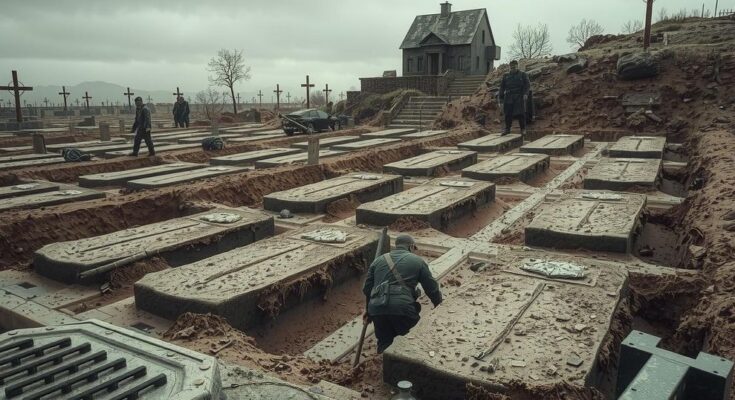The Sudanese army is reclaiming control of Khartoum from the RSF, marking a critical phase in the civil war. Civilians are severely affected, facing high casualty rates and humanitarian crises. Gravedigger Abidin Durma reflects on the overwhelming loss, as communities grapple with constant mourning and fear for the future of their children.
The civil war in Sudan intensifies as troops reclaim the presidential palace in Khartoum from the Rapid Support Forces (RSF). This development marks a significant moment in the ongoing conflict, where the army aims to regain full control over the capital, symbolizing a vital victory. Meanwhile, civilians continue to suffer immensely, facing extensive death tolls, destruction, and human rights violations, exacerbated by famine in certain areas.
Recent military offensives have resulted in the recapture of various districts in Khartoum. The army’s latest operation commenced a week ago, launching from a strategic rallying point in the north of the city. As morale among soldiers remains high, significant advances have been made, allowing integration with military headquarters. Reports indicate successful destruction of RSF convoys, highlighting the army’s operational effectiveness in the region.
Abidin Durma, the gravedigger of Omdurman, faces the harsh realities of the war daily. His family has deep historical ties to Sudan’s past leadership, and he administers one of the country’s oldest cemeteries. With the graveyard now expanding significantly due to constant casualties, he and volunteers regularly bury numerous bodies, indicating the grave human cost of the ongoing violence.
Mr. Durma states that they often inter “not less than 25, 30 or 50 bodies per day” due to the overwhelming demand from hospitals and unsafe conditions in other cemeteries. Tragedy continues to strike, with mass graves accumulating from artillery strikes on civilian areas, raising accusations of war crimes against both the army and RSF.
In Omdurman, communities mourn the losses, as families cope with grief and trauma. Abazar Abdel Habib recounted the fate of his family members, who fell victim to indiscriminate shelling. He strives to shield his surviving family from the harsh realities of war, vowing to provide for their emotional needs despite their profound loss.
Local women gather frequently to honor the deceased, indicating a community entrenched in mourning. Residents express the trauma endured by children, who live in constant fear and are forced to disrupt their education due to the relentless violence, illustrating the deep psychological scars left by the conflict.
The situation in Sudan remains dire as military engagements intensify, leading to significant territorial gains for the Sudanese army. However, the cost to civilian life is staggering, with countless families mourning their loved ones and children growing up in an environment of fear and uncertainty. The conflict, while potentially shifting in favor of the military, continues to wreak havoc across the nation, leaving enduring impacts that will affect Sudan for years to come.
Original Source: www.bbc.co.uk




